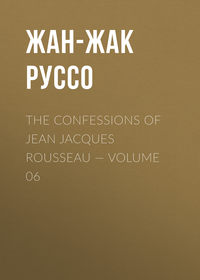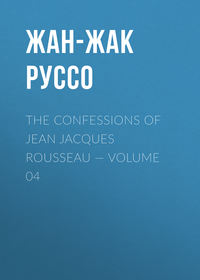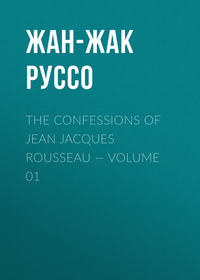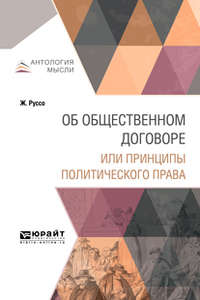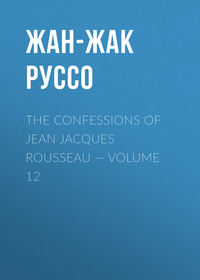 полная версия
полная версияПолная версия
The Confessions of Jean Jacques Rousseau — Complete
Amongst the connections I made in my neighborhood, of which I will not enter into a detail, I must mention that with Colonel Pury, who had a house upon the mountain, where he came to pass the summer. I was not anxious to become acquainted with him, because I knew he was upon bad terms at court, and with the lord marshal, whom he did not visit. Yet, as he came to see me, and showed me much attention, I was under the necessity of returning his visit; this was repeated, and we sometimes dined with each other. At his house I became acquainted with M. du Perou, and afterwards too intimately connected with him to pass his name over in silence.
M. du Perou was an American, son to a commandant of Surinam, whose successor, M. le Chambrier, of Neuchatel, married his widow. Left a widow a second time, she came with her son to live in the country of her second husband.
Du Perou, an only son, very rich, and tenderly beloved by his mother, had been carefully brought up, and his education was not lost upon him. He had acquired much knowledge, a taste for the arts, and piqued himself upon his having cultivated his rational faculty: his Dutch appearance, yellow complexion, and silent and close disposition, favored this opinion. Although young, he was already deaf and gouty. This rendered his motions deliberate and very grave, and although he was fond of disputing, he in general spoke but little because his hearing was bad. I was struck with his exterior, and said to myself, this is a thinker, a man of wisdom, such a one as anybody would be happy to have for a friend. He frequently addressed himself to me without paying the least compliment, and this strengthened the favorable opinion I had already formed of him. He said but little to me of myself or my books, and still less of himself; he was not destitute of ideas, and what he said was just. This justness and equality attracted my regard. He had neither the elevation of mind, nor the discrimination of the lord marshal, but he had all his simplicity: this was still representing him in something. I did not become infatuated with him, but he acquired my attachment from esteem; and by degrees this esteem led to friendship, and I totally forgot the objection I made to the Baron Holbach: that he was too rich.
For a long time I saw but little of Du Perou, because I did not go to Neuchatel, and he came but once a year to the mountain of Colonel Pury. Why did I not go to Neuchatel? This proceeded from a childishness upon which I must not be silent.
Although protected by the King of Prussia and the lord marshal, while I avoided persecution in my asylum, I did not avoid the murmurs of the public, of municipal magistrates and ministers. After what had happened in France it became fashionable to insult me; these people would have been afraid to seem to disapprove of what my persecutors had done by not imitating them. The ‘classe’ of Neuchatel, that is, the ministers of that city, gave the impulse, by endeavoring to move the council of state against me. This attempt not having succeeded, the ministers addressed themselves to the municipal magistrate, who immediately prohibited my book, treating me on all occasions with but little civility, and saying, that had I wished to reside in the city I should not have been suffered to do it. They filled their Mercury with absurdities and the most stupid hypocrisy, which, although, it makes every man of sense laugh, animated the people against me. This, however, did not prevent them from setting forth that I ought to be very grateful for their permitting me to live at Motiers, where they had no authority; they would willingly have measured me the air by the pint, provided I had paid for it a dear price. They would have it that I was obliged to them for the protection the king granted me in spite of the efforts they incessantly made to deprive me of it. Finally, failing of success, after having done me all the injury they could, and defamed me to the utmost of their power, they made a merit of their impotence, by boasting of their goodness in suffering me to stay in their country. I ought to have laughed at their vain efforts, but I was foolish enough to be vexed at them, and had the weakness to be unwilling to go to Neuchatel, to which I yielded for almost two years, as if it was not doing too much honor to such wretches, to pay attention to their proceedings, which, good or bad, could not be imputed to them, because they never act but from a foreign impulse. Besides, minds without sense or knowledge, whose objects of esteem are influence, power and money, and far from imagining even that some respect is due to talents, and that it is dishonorable to injure and insult them.
A certain mayor of a village, who from sundry malversations had been deprived of his office, said to the lieutenant of Val de Travers, the husband of Isabella: “I am told this Rousseau has great wit,—bring him to me that I may see whether he has or not.” The disapprobation of such a man ought certainly to have no effect upon those on whom it falls.
After the treatment I had received at Paris, Geneva, Berne, and even at Neuchatel, I expected no favor from the pastor of this place. I had, however, been recommended to him by Madam Boy de la Tour, and he had given me a good reception; but in that country where every new-comer is indiscriminately flattered, civilities signify but little. Yet, after my solemn union with the reformed church, and living in a Protestant country, I could not, without failing in my engagements, as well as in the duty of a citizen, neglect the public profession of the religion into which I had entered; I therefore attended divine service. On the other hand, had I gone to the holy table, I was afraid of exposing myself to a refusal, and it was by no means probable, that after the tumult excited at Geneva by the council, and at Neuchatel by the classe (the ministers), he would, without difficulty, administer to me the sacrament in his church. The time of communion approaching, I wrote to M. de Montmollin, the minister, to prove to him my desire of communicating, and declaring myself heartily united to the Protestant church; I also told him, in order to avoid disputing upon articles of faith, that I would not hearken to any particular explanation of the point of doctrine. After taking these steps I made myself easy, not doubting but M. de Montmollin would refuse to admit me without the preliminary discussion to which I refused to consent, and that in this manner everything would be at an end without any fault of mine. I was deceived: when I least expected anything of the kind, M. de Montmollin came to declare to me not only that he admitted me to the communion under the condition which I had proposed, but that he and the elders thought themselves much honored by my being one of their flock. I never in my whole life felt greater surprise or received from it more consolation. Living always alone and unconnected appeared to me a melancholy destiny, especially in adversity. In the midst of so many proscriptions and persecutions, I found it extremely agreeable to be able to say to myself: I am at least amongst my brethren; and I went to the communion with an emotion of heart, and my eyes suffused with tears of tenderness, which perhaps were the most agreeable preparation to Him to whose table I was drawing near.
Sometime afterwards his lordship sent me a letter from Madam de Boufflers, which he had received, at least I presumed so, by means of D’Alembert, who was acquainted with the marechal. In this letter, the first this lady had written to me after my departure from Montmorency, she rebuked me severely for having written to M. de Montmollin, and especially for having communicated. I the less understood what she meant by her reproof, as after my journey to Geneva, I had constantly declared myself a Protestant, and had gone publicly to the Hotel de Hollande without incurring the least censure from anybody. It appeared to me diverting enough, that Madam de Boufflers should wish to direct my conscience in matters of religion. However, as I had no doubt of the purity of her intention, I was not offended by this singular sally, and I answered her without anger, stating to her my reasons.
Calumnies in print were still industriously circulated, and their benign authors reproached the different powers with treating me too mildly. For my part, I let them say and write what they pleased, without giving myself the least concern about the matter. I was told there was a censure from the Sorbonne, but this I could not believe. What could the Sorbonne have to do in the matter? Did the doctors wish to know to a certainty that I was not a Catholic? Everybody already knew I was not one. Were they desirous of proving I was not a good Calvinist? Of what consequence was this to them? It was taking upon themselves a singular care, and becoming the substitutes of our ministers. Before I saw this publication I thought it was distributed in the name of the Sorbonne, by way of mockery: and when I had read it I was convinced this was the case. But when at length there was not a doubt of its authenticity, all I could bring myself to believe was, that the learned doctors would have been better placed in a madhouse than they were in the college.
I was more affected by another publication, because it came from a man for whom I always had an esteem, and whose constancy I admired, though I pitied his blindness. I mean the mandatory letter against me by the archbishop of Paris. I thought to return an answer to it was a duty I owed myself. This I felt I could do without derogating from my dignity; the case was something similar to that of the King of Poland. I had always detested brutal disputes, after the manner of Voltaire. I never combat but with dignity, and before I deign to defend myself I must be certain that he by whom I am attacked will not dishonor my retort. I had no doubt but this letter was fabricated by the Jesuits, and although they were at that time in distress, I discovered in it their old principle of crushing the wretched. I was therefore at liberty to follow my ancient maxim, by honoring the titulary author, and refuting the work which I think I did completely.
I found my residence at Motiers very agreeable, and nothing was wanting to determine me to end my days there, but a certainty of the means of subsistence. Living is dear in that neighborhood, and all my old projects had been overturned by the dissolution of my household arrangements at Montmorency, the establishment of others, the sale or squandering of my furniture, and the expenses incurred since my departure. The little capital which remained to me daily diminished. Two or three years were sufficient to consume the remainder without my having the means of renewing it, except by again engaging in literary pursuits: a pernicious profession which I had already abandoned. Persuaded that everything which concerned me would change, and that the public, recovered from its frenzy, would make my persecutors blush, all my endeavors tended to prolong my resources until this happy revolution should take place, after which I should more at my ease choose a resource from amongst those which might offer themselves. To this effect I took up my Dictionary of Music, which ten years’ labor had so far advanced as to leave nothing wanting to it but the last corrections. My books which I had lately received, enabled me to finish this work; my papers sent me by the same conveyance, furnished me with the means of beginning my memoirs to which I was determined to give my whole attention. I began by transcribing the letters into a book, by which my memory might be guided in the order of fact and time. I had already selected those I intended to keep for this purpose, and for ten years the series was not interrupted. However, in preparing them for copying I found an interruption at which I was surprised. This was for almost six months, from October, 1756, to March following. I recollected having put into my selection a number of letters from Diderot, De Leyre, Madam d’ Epinay, Madam de Chenonceaux, etc., which filled up the void and were missing. What was become of them? Had any person laid their hands upon my papers whilst they remained in the Hotel de Luxembourg? This was not conceivable, and I had seen M. de Luxembourg take the key of the chamber in which I had deposited them. Many letters from different ladies, and all those from Diderot, were without date, on which account I had been under the necessity of dating them from memory before they could be put in order, and thinking I might have committed errors, I again looked them over for the purpose of seeing whether or not I could find those which ought to fill up the void. This experiment did not succeed. I perceived the vacancy to be real, and that the letters had certainly been taken away. By whom and for what purpose? This was what I could not comprehend. These letters, written prior to my great quarrels, and at the time of my first enthusiasm in the composition of ‘Eloisa’, could not be interesting to any person. They contained nothing more than cavillings by Diderot, jeerings from De Leyre, assurances of friendship from M. de Chenonceaux, and even Madam d’Epinay, with whom I was then upon the best of terms. To whom were these letters of consequence? To what use were they to be put? It was not until seven years afterwards that I suspected the nature of the theft.
The deficiency being no longer doubtful, I looked over my rough drafts to see whether or not it was the only one. I found several, which on account of the badness of my memory, made me suppose others in the multitude of my papers. Those I remarked were that of the ‘Morale Sensitive’, and the extract of the adventures of Lord Edward. The last, I confess, made me suspect Madam de Luxembourg. La Roche, her valet de chambre, had sent me the papers, and I could think of nobody but herself to whom this fragment could be of consequence; but what concern could the other give her, any more than the rest of the letters missing, with which, even with evil intentions, nothing to my prejudice could be done, unless they were falsified? As for the marechal, with whose friendship for me, and invariable integrity, I was perfectly acquainted, I never could suspect him for a moment. The most reasonable supposition, after long tormenting my mind in endeavoring to discover the author of the theft, was that which imputed it to D’Alembert, who, having thrust himself into the company of Madam de Luxembourg, might have found means to turn over these papers, and take from amongst them such manuscripts and letters as he might have thought proper, either for the purpose of endeavoring to embroil me with the writer of them, or to appropriate those he should find useful to his own private purposes. I imagined that, deceived by the title of Morale Sensitive, he might have supposed it to be the plan of a real treatise upon materialism, with which he would have armed himself against me in a manner easy to be imagined. Certain that he would soon be undeceived by reading the sketch and determined to quit all literary pursuits, these larcenies gave me but little concern. They besides were not the first the same hand had committed upon me without having complained of these pilferings.
[I had found in his ‘Elemens de Musique’ (Elements of Music) several things taken from what I had written for the ‘Encyclopedie’, and which were given to him several years before the publication of his elements. I know not what he may have had to do with a book entitled ‘Dictionaire des Beaux Arts’ (Dictionary of the Fine Arts) but I found in it articles transcribed word for word from mine, and this long before the same articles were printed in the Encyclopedie.]
In a very little time I thought no more of the trick that had been played me than if nothing had happened, and began to collect the materials I had left for the purpose of undertaking my projected confessions.
I had long thought the company of ministers, or at least the citizens and burgesses of Geneva, would remonstrate against the infraction of the edict in the decree made against me. Everything remained quiet, at least to all exterior appearance; for discontent was general, and ready, on the first opportunity, openly to manifest itself. My friends, or persons calling themselves such, wrote letter after letter exhorting me to come and put myself at their head, assuring me of public separation from the council. The fear of the disturbance and troubles which might be caused by my presence, prevented me from acquiescing with their desires, and, faithful to the oath I had formerly made, never to take the least part in any civil dissension in my country, I chose rather to let the offence remain as it was, and banish myself forever from the country, than to return to it by means which were violent and dangerous. It is true, I expected the burgesses would make legal remonstrances against an infraction in which their interests were deeply concerned; but no such steps were taken. They who conducted the body of citizens sought less the real redress of grievances than an opportunity to render themselves necessary. They caballed but were silent, and suffered me to be bespattered by the gossips and hypocrites set on to render me odious in the eyes of the populace, and pass off their misdemeanors as religious zeal.
After having, during a whole year, vainly expected that some one would remonstrate against an illegal proceeding, and seeing myself abandoned by my fellow-citizens, I determined to renounce my ungrateful country in which I never had lived, from which I had not received either inheritance or services, and by which, in return for the honor I had endeavored to do it, I saw myself so unworthily treated by unanimous consent, since they, who should have spoken, had remained silent. I therefore wrote to the first syndic for that year, to M. Favre, if I remember right, a letter in which I solemnly gave up my freedom of the city of Geneva, carefully observing in it, however, that decency and moderation, from which I have never departed in the acts of haughtiness which, in my misfortunes, the cruelty of my enemies have frequently forced upon me,
This step opened the eyes of the citizens, who feeling they had neglected their own interests by abandoning my defence, took my part when it was too late. They had wrongs of their own which they joined to mine, and made these the subject of several well-reasoned representations, which they strengthened and extended, as the refusal of the council, supported by the ministry of France, made them more clearly perceive the project formed to impose on them a yoke. These altercations produced several pamphlets which were undecisive, until that appeared entitled ‘Lettres ecrites de la Campagne’, a work written in favor of the council, with infinite art, and by which the remonstrating party, reduced to silence, was crushed for a time. This production, a lasting monument of the rare talents of its author, came from the Attorney-General Tronchin, a man of wit and an enlightened understanding, well versed in the laws and government of the republic. ‘Siluit terra’.
The remonstrators, recovered from their first overthrow, undertook to give an answer, and in time produced one which brought them off tolerably well. But they all looked to me, as the only person capable of combating a like adversary with hope of success. I confess I was of their opinion, and excited by my former fellow-citizens, who thought it was my duty to aid them with my pen, as I had been the cause of their embarrassment, I undertook to refute the ‘Lettres ecrites de la Campagne’, and parodied the title of them by that of ‘Lettres ecrites de la Montagne,’ which I gave to mine. I wrote this answer so secretly, that at a meeting I had at Thonon, with the chiefs of the malcontents to talk of their affairs, and where they showed me a sketch of their answer, I said not a word of mine, which was quite ready, fearing obstacles might arise relative to the impression of it, should the magistrate or my enemies hear of what I had done. This work was, however known in France before the publication; but government chose rather to let it appear, than to suffer me to guess at the means by which my secret had been discovered. Concerning this I will state what I know, which is but trifling: what I have conjectured shall remain with myself.
I received, at Motiers, almost as many visits as at the Hermitage and Montmorency; but these, for the most part were a different kind. They who had formerly come to see me were people who, having taste, talents, and principles, something similar to mine, alleged them as the causes of their visits, and introduced subjects on which I could converse. At Motiers the case was different, especially with the visitors who came from France. They were officers or other persons who had no taste for literature, nor had many of them read my works, although, according to their own accounts, they had travelled thirty, forty, sixty, and even a hundred leagues to come and see me, and admire the illustrious man, the very celebrated, the great man, etc. For from the time of my settling at Motiers, I received the most impudent flattery, from which the esteem of those with whom I associated had formerly sheltered me. As but few of my new visitors deigned to tell me who or what they were, and as they had neither read nor cast their eye over my works, nor had their researches and mine been directed to the same objects, I knew not what to speak to them upon: I waited for what they had to say, because it was for them to know and tell me the purpose of their visit. It will naturally be imagined this did not produce conversations very interesting to me, although they, perhaps, were so to my visitors, according to the information they might wish to acquire; for as I was without suspicion, I answered without reserve, to every question they thought proper to ask me, and they commonly went away as well informed as myself of the particulars of my situation.
I was, for example, visited in this manner by M. de Feins, equerry to the queen, and captain of cavalry, who had the patience to pass several days at Motiers, and to follow me on foot even to La Ferriere, leading his horse by the bridle, without having with me any point of union, except our acquaintance with Mademoiselle Fel, and that we both played at ‘bilboquet’. [A kind of cup and ball.]
Before this I had received another visit much more extraordinary. Two men arrived on foot, each leading a mule loaded with his little baggage, lodging at the inn, taking care of their mules and asking to see me. By the equipage of these muleteers they were taken for smugglers, and the news that smugglers were come to see me was instantly spread. Their manner of addressing me sufficiently showed they were persons of another description; but without being smugglers they might be adventurers, and this doubt kept me for some time on my guard. They soon removed my apprehensions. One was M. de Montauban, who had the title of Comte de la Tour du Pin, gentleman to the dauphin; the other, M. Dastier de Carpentras, an old officer who had his cross of St. Louis in his pocket, because he could not display it. These gentlemen, both very amiable, were men of sense, and their manner of travelling, so much to my own taste, and but little like that of French gentlemen, in some measure gained them my attachment, which an intercourse with them served to improve. Our acquaintance did not end with the visit; it is still kept up, and they have since been several times to see me, not on foot, that was very well for the first time; but the more I have seen of these gentlemen the less similarity have I found between their taste and mine; I have not discovered their maxims to be such as I have ever observed, that my writings are familiar to them, or that there is any real sympathy between them and myself. What, therefore, did they want with me? Why came they to see me with such an equipage? Why repeat their visit? Why were they so desirous of having me for their host? I did not at that time propose to myself these questions; but they have sometimes occurred to me since.
Won by their advances, my heart abandoned itself without reserve, especially to M. Dastier, with whose open countenance I was more particularly pleased. I even corresponded with him, and when I determined to print the ‘Letters from the Mountains’, I thought of addressing myself to him, to deceive those by whom my packet was waited for upon the road to Holland. He had spoken to me a good deal, and perhaps purposely, upon the liberty of the press at Avignon; he offered me his services should I have anything to print there: I took advantage of the offer and sent him successively by the post my first sheets. After having kept these for some time, he sent them back to me, “Because,” said he, “no bookseller dared to sell them;” and I was obliged to have recourse to Rey taking care to send my papers, one after the other, and not to part with those which succeeded until I had advice of the reception of those already sent. Before the work was published, I found it had been seen in the office of the ministers, and D’Escherny, of Neuchatel, spoke to me of the book, entitled ‘De l’Homme de la Montagne’, which D’Holbach had told him was by me. I assured him, and it was true, that I never had written a book which bore that title. When the letters appeared he became furious, and accused me of falsehood; although I had told him truth. By this means I was certain my manuscript had been read; as I could not doubt the fidelity of Rey, the most rational conjecture seemed to be, that my packets had been opened at the post-house.





